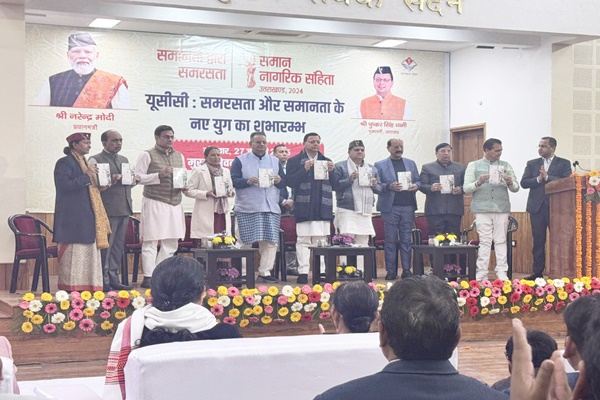Last Updated on January 27, 2025 2:06 pm by INDIAN AWAAZ
Despite opposition from various political parties and religious groups, the state government has gone out ahead with the implementation, making the hill state the first in the country to have a Uniform Civil Code

AMN
The Uniform Civil Code (UCC) has come into force in Uttarakhand, making it the first state to implement such a law. UCC aims to standardize personal civil laws, ensuring equal rights for all citizens. Implementation of UCC was a major commitment of the BJP in the run-up to the 2022 assembly polls in Uttarakhand which saw the party storm to power for a second consecutive term.
The state cabinet recently approved the rules and regulations for UCC’s implementation and authorised the chief minister to decide a date for it. The UCC seeks to establish a uniform and equal set of rules on marriage, divorce, succession, and inheritance for all citizens in the state, except the scheduled tribes, irrespective of religion. It makes registration of all marriages and live-in relationships mandatory.
Following are the key provisions of the UCC:
Marriage and divorce
The UCC standardises the legal marriage age for men and women at 21 and 18 years, respectively, and establishes uniform grounds and procedures for divorce across all religions.
Ban on polygamy and ‘Halala’
The UCC prohibits polygamy and the practice of ‘halala’ across all communities.
Marriage registration
Marriages conducted after the Act’s implementation must be registered within 60 days. Online facilities will be provided to streamline the process.
Live-in relationships
Registration of live-in relationships will be mandatory for legal recognition and protection.
Succession laws
The UCC Act establishes uniform regulations for testamentary succession, including simplified processes for creating and revoking wills and codicils.
Privileged will provision
Soldiers, Air Force personnel, and mariners engaged in expeditions or warfare can create flexible, privileged wills under special provisions.
The debate surrounding the UCC is not just limited to Uttarakhand; rather, it’s a subject of national discourse, especially in light of Article 44 of the Indian Constitution, which advocates for a Uniform Civil Code across the country.
In his Independence Day speech, PM Narendra Modi referred to the Supreme Court’s direction on the need for a common code, stressing that fulfilling the vision of the Constitution framers remains a national goal.
Several BJP-ruled states, including Assam, have expressed interest in adopting Uttarakhand’s UCC as a model for their legal systems.
Reacting to the move of UCC implementation by Uttarakhand, Congress spokesperson Abhishek Singhvi criticised the implementation as a “pilot project” initiated without national consensus.
Singhvi suggested that the BJP is using Uttarakhand as a testing ground before pushing for broader implementation across the country.
